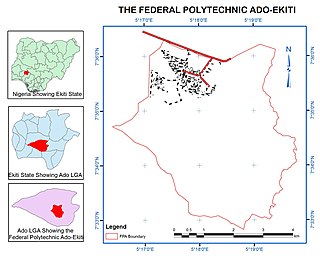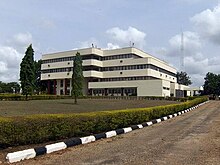
Akure is a city in south-western Nigeria, and is the largest city and capital of Ondo State. The city had a population of 484,798 as at the 2006 population census.

Ondo or Ondo State is a state in Nigeria created on February 3, 1976, from the former Western State. It originally included the present Ekiti State, which was split off in 1996. Akure is the state capital. Each Nigerian state has several ministerial offices representing the federal government. Ondo State. Ondo state borders: Ekiti State to the north, Kogi State to the northeast, Edo State to the east, Delta State to the southeast, Ogun State to the southwest, and Osun State to the northwest and Atlantic Ocean to the south.

Ekiti State University Ado Ekiti was established as Obafemi Awolowo University, Ado-Ekiti on 30 March 1982 by the administration of Chief Michael Adekunle Ajasin, the first civilian governor of Ondo State. The university is a member of the Association of Commonwealth Universities. It is located about 12 minutes drive from the center of the city of Ado-Ekiti, Ekiti State in Western Nigeria.

Abubakar Tafawa Balewa University (ATBU) is a federal university of technology located in Bauchi, north east Nigeria. The university is named after the first Prime Minister of the Federal Republic of Nigeria, Sir Abubakar Tafawa Balewa. The motto of the university is "Doctrina Mater Artium", which means "Education is the mother of the practical arts".
The University of Abuja is a tertiary institution in the Nigerian capital, Abuja. It was established on January 1, 1988 as a dual-mode university with the mandate to run conventional and distance learning programmes. Academic work began in the University in 1990 with the matriculation of its pioneer students.

University of Ilorin, also known as Unilorin, is a federal government-owned university in Ilorin, Kwara State, Nigeria. It was established by a Decree of the Federal Military Government in August, 1975. The establishment aimed to implement one of the educational directives of the Third National Development Plan which was aimed at providing more opportunities for Nigerians aspiring to acquire university education and to generate high-level manpower, so vital for the rapidly expanding economy. Compared to other higher institutions of learning in the country, the institution has one of the largest landmass covering approximately 5000 hectares of land.
Redeemer's University is a private university in Ede, Osun, off Gbongan-Oshogbo Road, Osun State, Nigeria. Established in 2005, the university is owned by the Redeemed Christian Church of God.
The Federal University of Technology Yola now known as Modibbo Adama University of Technology, Yola, is a research intensive university located in Girei a town in Adamawa State in Northeastern Nigeria. It is one of the 27 federal government university system and one of only 4 federal technology universities established with the sole purpose of advancing science based research. The Federal University of Technology Yola is accredited by the National Universities Commission. The university offers associate's, bachelor's, master's, and PhD degrees.
Bauchi State University Gadau (BASUG) is located in Bauchi State in Nigeria. Its main campus is in Gadau and comprises the Faculty of Sciences & Arts, with other campuses in Misau and Bauchi, respectively.

Federal Polytechnic, Ado-Ekiti is a polytechnic in Ado Ekiti, Ekiti State, Nigeria. The rector is Engr. Dayo Hephzibah Oladebeye.(Phd). The school is located along Ado/Ikare road, Ado-Ekiti, Ekiti State, Nigeria.

Joseph Adeola Fuwape is a Nigerian academic, and is the current Vice Chancellor of Federal University of Technology Akure(FUTA). He succeeded Prof. Daramola Gregory. Before then, he was the Vice Chancellor at Salem University. Prior to succeeding Professor Paul Omojo Omaji as Vice Chancellor of Salem University, Fuwape was Head of Forestry and Wood Technology Department at Federal University of Technology Akure(FUTA) for seven years. He was Dean School of Agriculture and Agricultural Technology for four years at FUTA, and a member of the university's Governing Council there for eight years. He was the first Director of Quality Assurance Unit at FUTA from 2010 to 2012.
Igbekele Amos Ajibefun is a Nigerian professor of Agricultural economics, former Rector of Rufus Giwa Polytechnic and incumbent Vice chancellor of Adekunle Ajasin University. He is the fifth substantive Vice Chancellor of Adekunle Ajasin.
Albert Adeoye Ilemobade was a Nigerian professor of Veterinary Medicine, educational administrator and former Vice chancellor of Federal University of Technology, Akure. He served as Vice chancellor of the Federal University of Technology, Akure for 7 years before he retired from the civil service in 1995. He served as consultant to the World Health Organization on Tse-tse fly and Trypanosomiasis as well as consultant to Food and Agriculture Organization of the United Nations. He was born in Ondo State in 1936
Adewale Oke Adekola was a Nigerian engineer, academic, author, and administrator. He was the first Nigerian dean of engineering and head of civil engineeringat the University of Lagos. He was the founding vice chancellor of the Abubakar Tafawa Balewa University Bauchi and emeritus professor of the University of Lagos. He was a pioneer of engineering educationin Nigeria and reputed as a great teacher. He became one of the first Nigerians to be awarded the degree of Doctor of Science (DSc) in 1976 - awarded by London University in engineering.
The Delta State Polytechnic Ogwashi-Uku is one of the three polytechnics in Delta State, Nigeria, Located in Ogwashi-Uku Delta State, Nigeria. The polytechnic offers National Diplomas and Higher National Diplomas in Art and Design, Business, Engineering and Applied Sciences.
Prof. Sunday Roberts Ogunduyile is a Nigerian academic and academic administrator. A Professor of Industrial Design, he has served as Dean of School of Environmental Technology at the Federal University of Technology, Akure (FUTA) and as Director of FUTA Business Development Company. He is currently Vice Chancellor of Ondo State University of Science and Technology.
Ibiyinka A. Fuwape is a Nigerian academic, professor in physics and the 2nd substantive Vice-Chancellor of the Michael and Cecilia Ibru University, a private university in Nigeria.
Ibiyemi Samuel Tunji is a Nigerian academic, lecturer, Professor of Electrical & Electronics Engineering. He is the second Vice-Chancellor of the Achievers University, Owo Ondo State. He was appointed on 1 April 2014 to succeed Professor Johnson Odebiyi, the pioneer Vice-chancellor, whose tenure started in 2008 and ended in 2014.
Joseph Afolayan is a Nigerian Professor of Civil Engineering. He is the former Acting Vice chancellor of Landmark University and the current Vice chancellor of Anchor University Lagos

Salihu Mustafa, FNSE, FAENG, FNAHS, FAS, is a Nigerian academic, Professor of civil engineering and former Vice-Chancellor of Federal University of Technology Yola (FUTY), Yola, Adamawa State, Nigeria. He has taught in many universities in Nigeria and is currently a visiting Professor to Kebbi State University of Science and Technology, Aliero and Usmanu Danfodiyo University, Sokoto. He is married to Hajiya Fatima and they have four children.









